The Marquess of Northampton gave to the new village fire brigade a small horse drawn curricle fire engine hand manual and an old thatched flailing barn in which to keep it.

This stone and thatched barn was on Main Street, by Saddledon House, was called the Engine House and was used as the Fire Station until 1973. It had previously served as a clubhouse for the village lads to learn boxing in the winter evenings and for flailing the corn in the late summer.
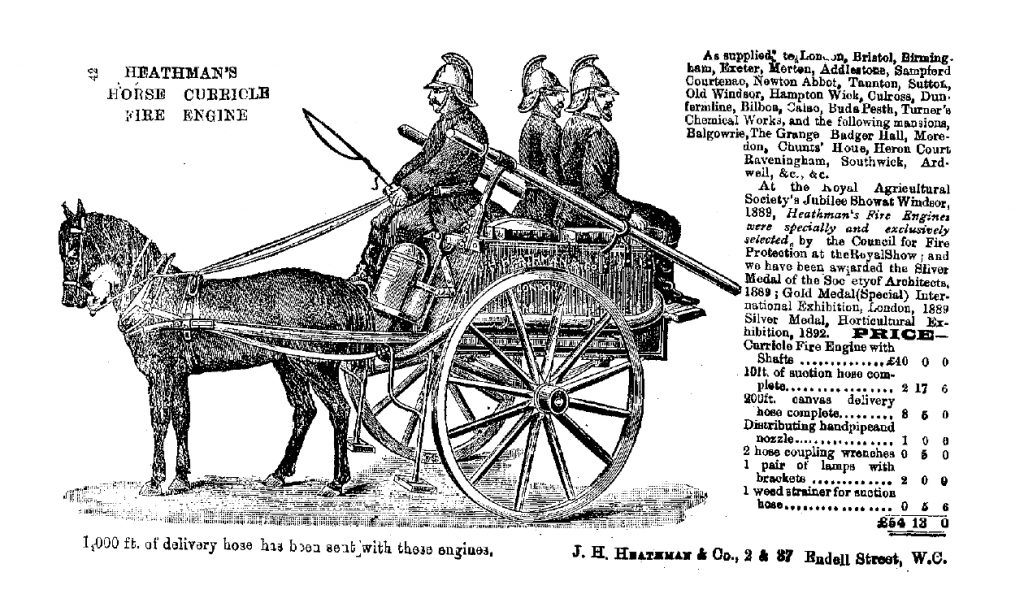
On Tuesday 12 August 1897, the hand manual arrived in the village, a generous gift to the village to commemorate the sixty years of Queen Victoria’s reign.
At Compton Wynyates there was a Small Platform Fire Engine.
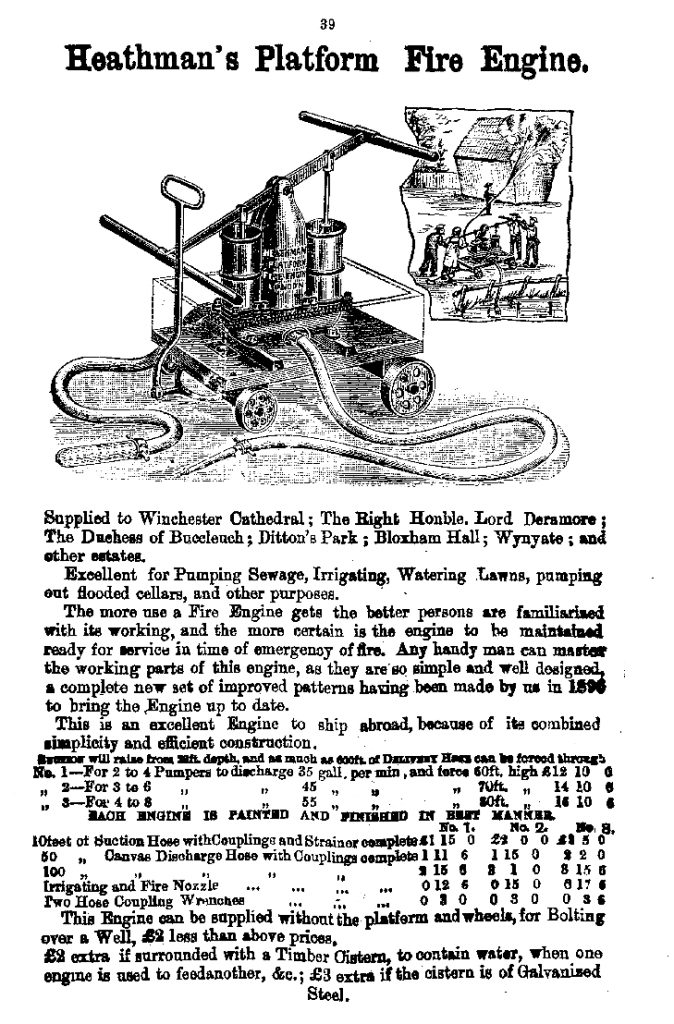
The first Firemen in the Brigade were Mr George Eden, Mr Thomas Hirons, Mr George Paxton, Mr Thomas Coles, Mr Thomas Middleton, Mr Thomas Hall, Mr William Harris, Mr William Geden, Mr William Walker, Mr Ernest Wells, Mr William Usher, Mr Fred Jeffs, Mr Nicholas Heritage, Mr George Hancox, Mr George Walker, Mr Charles Henry Wilkes, Mr William Pargeter, Mr Edward Robinson, Mr William Walker, Mr Frank Gardner, Mr Thomas Parish, Mr Hewins Butcher, Mr Beesley Wells, Mr James Robinson, Mr Frank Townsend and Mr Philip Berridge, Hon Secretary.
The Brigade was maintained by subscriptions, donations and fund raising, with the cost of attendance at fires paid by the insurers. The only insurance plaques in the village are for the County Fire Office. It was decided at the meeting in September 1897 that a Bugle should be purchased, which would be blown in the case of a fire. It was also decided that 50 copies of the rules would be printed. The Copper Bugle and Silver mouth piece cost £0.19.6d on 2 Dec 1897, and the extra copies of the rules cost £0.6.6d.
Other items purchased included the following:
Accounts Book and Minute Book £0.1.0d (1 shilling)
Other Stationery £0.1.0d
Water Basket from Thornton of Alkerton £0.2.0d
2 Carriage Lamps (to burn petroleum oil) cost £0.10.0d each from Mawle & Son, Banbury.
2 Hurricane Lamps cost £0.3.0d each, again from Mawle & Son.
Total expenses during the first year from 1897 to October 1898 amounted to £3.17.5d.

Subscription income received during the same period was as follows:
The Marquess of Northampton £10.00.0d
Upper Tysoe £1.10.6d
Middle Tysoe £1.04.6d
Lower Tysoe £1.00.0d
Compton Wynyates £0.05.0d
Total £14.00.0d
This produced a balance of £10.2.7d
Three locks with six keys were also purchased at a cost of £0-3-0d each. The Captain, Lieutenant, Engineer, Bugler Mr W Harris and Mr T Hall were to hold the keys to the Engine House. A drag fork was bought from Mr Price, the village blacksmith and a box was fixed to the trolley to carry tools. Mr T Parish kindly offered an axe and a saw. The 4th Marquess died after a short illness on 11 September 1897. He was succeeded by his son as president of the Brigade.
During 1898, Mr W Harris handed in his resignation, as a result of which the Captain offered to collect the subscriptions throughout Lower Tysoe. Also during that period, a 30 ft pole, an iron pulley wheel and a good hemp rope for the drying of hose were obtained. Further purchases included an iron chain 22 yards long by 3/16” at a cost of £0-10-0d for the removal of burning thatch, and a tortoise stove for the Engine House which cost £0-7-6d. Cupboards and boards were also fitted in the Engine House.
In the following year, 1899, it was proposed that an outfit for one man be purchased for the purpose of holding the nozzle. A pair of waterproof leggings was bought for the sum of £0-1-6d. A second-hand helmet was supplied for approval by Shand Mason & Co. This was followed by the purchase of 10 helmets for the firemen at a cost of £5-0-0d. All helmets were to be kept at the Engine House, and collected by the firemen as they arrived in response to the fire alarm.
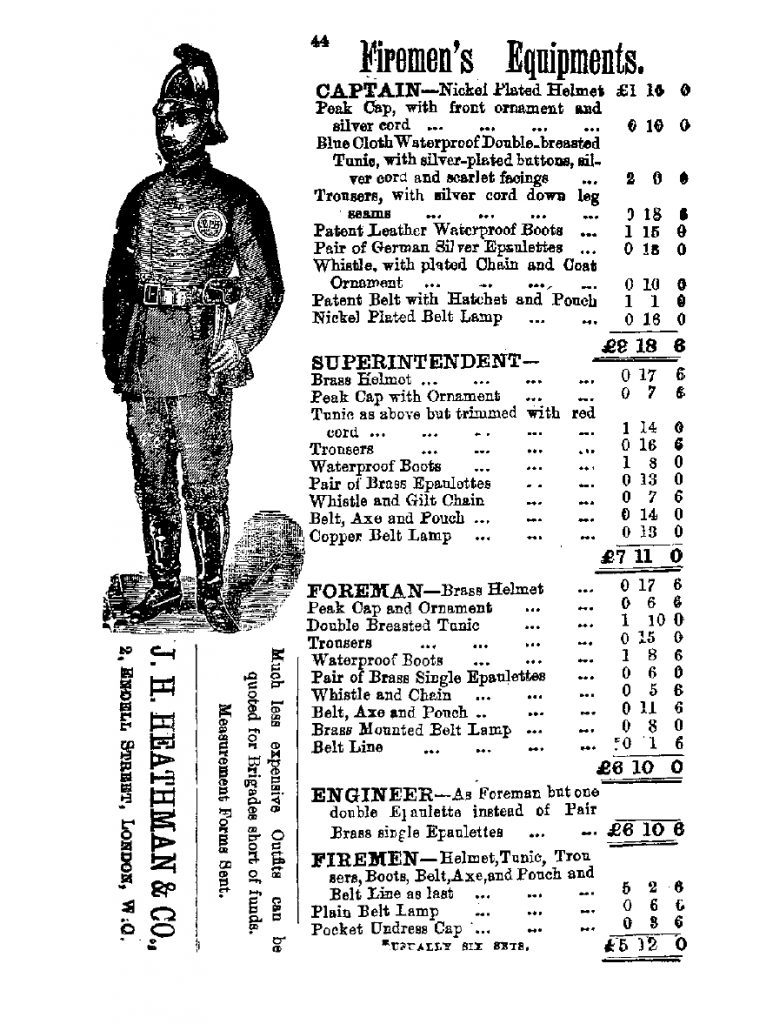
On Monday 1 June 1898, at dinner time, the cry of fire was heard, the firemen were summoned and the engine started in less than ten minutes. Their services on this occasion were, however, not required, as the fire happily had been put out before their arrival. As this was the first time the Brigade had been called upon, it created a sensation in the villages.
The Marquess of Northampton invited all of the firemen to spend a day at Castle Ashby, near Northampton, one of his other homes. Twenty-two of the men had a good day out with his lordship, to whom a vote of thanks was awarded for his kindness.
6 July 1899 Brake Accident, Warwick Excursionists Injured
On 6 July 1899 a serious accident occurred on the notorious Sunrising Hill, just outside Tysoe, on the Edge Hill escarpment (now the A422 Banbury to Stratford road) involving a party from Warwick, out on an excursion in two horse-drawn vehicles. Although the road was greasy, the passengers were not taken off the brakes (coaches) before ascending the hill. Some distance up the hill the horses attached to the first brake lost their footing, the brakes failed to act and the vehicle began sliding back down the hill towards the second coach. Before many yards it turned over on its side, throwing out its 22 occupants. All of them were badly shaken and an old man named Edward King, a greengrocer of Crompton St., Warwick, had the wheel fall on his chest. He suffered three broken ribs and other injuries. No doctor was at hand until eventually Dr Fenton arrived from Kineton and King was left with him at Sunrising Hill all night in a critical condition. Eight other people were hurt. Mr Arthur Butler, who was cycling, narrowly escaped being hurt. The vehicles belonged to the Warwick Tramway Company.
At the October meeting that year it was proposed that the Engineer should have an assistant for all the extra work necessary. Mr G Walker was elected as Assistant Engineer. It was proposed also that one helmet be kept solely for use by the Engineer. During 1900, Firemen G Paxton and W Bottrill were absent from the Brigade as a result of fighting in The Boer War in South Africa. As they were at war, they were exempt from fines, but Members who failed to produce their copy of the rules had to pay a fine of £0-0-6d.
On the Monday afternoon of 1 Jan 1900, a Church Parade was held through the village with firemen and manual pump to commemorate the new century. It was proposed that the first Thursday night in each month be allocated for a meeting for drills. A new spade for the use of the Brigade was purchased from Mawle and Sons of Banbury. More villagers were asked to become members of the brigade. Firemen T Middleton, T Butcher and G Eden were dismissed for breaches of rule 9.
A fire occurred in the village at Mr William Butcher’s home. Use of the engine cost £1-10-0d and £0-5-0d was given to the Engineer for extra work at this fire. It was also decided that ten ‘pumpers’ should be paid for all their work.
It was proposed that the Brigade should have a Supper, and members present at this fire were each to give their pay of £0-2-0d towards the cost. Members not present were to do the same. The date of the Supper was fixed as 8 March 1901.
The First Supper of the Brigade
1901 The first Supper of the Brigade was held in the Engine House on 8 March, and the following was extracted from the records:
On this Tuesday all of the members of the Brigade met for supper. The catering was entrusted to Mr N Heritage who gave great satisfaction and it was hoped that this would not be the last entertainmentof its kind the Brigade would have. On the removal of the cloth, the Captain, Mr W Pargeter, who occupied the chair, gave the health of His Majesty King Edward VII,remarking that he thought it would be the first time his Majesty’s health had been drunk in any gathering in Tysoe. The health of the Marquess of Northampton as President was also proposed by the Captain and heartily responded to. The Captain was given by Lieutenant Parish, who said he thought the Captain had done more than anyone else to keep the Brigade going.
Mr Pargeter, in response, thanked them very much for the way in which they had drunk his health and said that it was not through him alone, but through the ready obedience to all orders and with the help of the Officers and Committee that the Brigade had worked so well.
The Navy and Army was given by Mr W B Wells, who said that the Brigade had not been backward in giving its members to fight the Country’s battles, having two in South Africa, Private G Paxton in the Coldstream Guards and Trooper W Bottrill in the Warwickshire Yeomanry, and he hoped that when they all met on another occasion like the present one, they would have them both present.
Mr Robinson responded and gave the health of the Engineer, Mr W Usher, who had done his work exceedingly well. Mr Usher in response said it gave him great pleasure to know that his work gave satisfaction. He hoped if at any time any member who had any fault to find would tell him and he would do his best to remedy it.
The Toast, proposed by the Captain, was responded to by Mr H Heritage. The remainder of the evening was occupied by vocal and instrumental pieces given by the members of the Brigade, and an enjoyable gathering was brought to a close by singing the National Anthem.
Bills for the supper were approved and paid as follows:
Mr. Heritage £0-5-2d.
Mr. Page £0-1-4d.
Mr. W. Usher £0-3-0d.
The total cost of the supper therefore was £0-9-6d. A flagpole was erected at a cost of £0-2-0d at the Engine House for use in any celebrations etc.
Fireman died in Boer War, 30 March 1901
Fireman Walter Bottrill, called up on July 5 1899, died aged 29. A telegram was received by Mr T Bottrill of Tysoe mentioning the death of his son Walter, of the 5th Company Imperial Yeomanry, who died of enteric fever at Harrismith, South Africa on 30 March 1901. The deceased was well known in the village and the news of his death cast a gloom over the parish. A memorial service was arranged for Good Friday afternoon at the Church. The bells were tolled from 2pm to 2.30pm and flags were hoisted at half-mast on the church tower and at the Fire Engine House. The Foresters (Greenwood Court) met at the old school room and walked in procession to the church to the number of 26 all wearing their sashes.

The Tysoe Fire Brigade met at their headquarters and came in a body to the service with the Captain Mr Pargeter, Lieutenant W Usher, and Engineer Parish. Sixteen of the Brigade were present. Of the 138 who went out with the Warwickshire Yeomanry, only 18 remain on active service.
On 29 Aug 1901 a memorial tablet to trooper Bottrill was erected in the Church.
Tuesday 9 April 1901, Fire in Tysoe Church
At about six o’clock in the evening, smoke was observed coming out of the belfry windows. On entering the church it was found that the beams of the belfry were smouldering, probably from the heater flue which runs up the inside of the tower and must have been smouldering since the previous Sunday. After trying ineffectually to stamp the fire out with buckets of water, the alarm was raised.
The bugle sounded and the engine and the company were on the spot within ten minutes. It was found necessary to cut away part of the side beams to get at the fire. Water was drawn from the brook near the church gates and was applied to the fire with a hose line. All danger was over by about nine o’clock but it was ten o’clock at night before the men and the engine left.
It was proposed that the Engineer should receive £0-6-0d for his work at the church fire but an amendment, proposed by Mr W B Wells and Mr Robinson that he should receive only £0-5-0d, was carried. During the year a railway carriage was purchased for £0-0-11d for the storage of coal to be used in the stove in the Engine House. The cost of the coal was £0-7-10d.
21 November 1901, Fire at Brixfield Farm, Tysoe
The village was aroused by a cry of fire soon after ten o’clock in the morning. A report ran through the village that Hardwick House was in flames. The bells rang, the bugle sounded the alarm and the firemen were gathered together and off went the engine in less than ten minutes.
It proved to be at Brixfield Farm, the next farm house, and not at Hardwick. The chimney had caught fire and a protruding beam was smouldering. The firemen stayed until the fire was subdued. The total cost involved was £3-17-6, which included cost for the fire £2-10-0d, hire of horse to pull engine £0-12-6d, Engineer’s expenses £0-4-0d and Pumpers £0-11-0d.
1902
New equipment was bought from Shand and Mason, including an axe and belt £2-3-9d, A jet-pipe branch at £1-6-0d, straps, loops and buckles £0-5-3d.
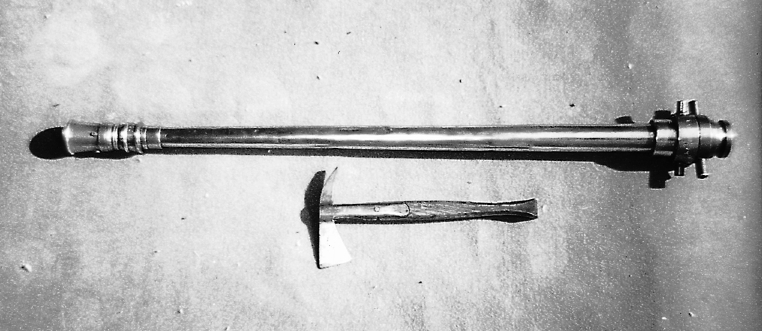
24 July 1902, Home coming of Reservist Mr George Paxton
The bunting was put up in the village and the Fire Brigade gave a Grand Supper to welcome his return. This took place on Friday in the Engine House, which was prettily decorated for the occasion. The supper was served splendidly by Mrs Harry Heritage. Captain Pargeter was at the head of the table and Lieutenant Wells at the other end. After supper the usual loyal toasts were given, after which the Captain gave Our Returned Companion, expressing the pleasure of the company at seeing their companion returned safe and sound. He presented Mr Paxton with a silver-mounted pipe, pouch and tobacco as a token of the members’ esteem. Mr Paxton, who was deeply affected, returned his thanks. The remainder of the evening was enlivened by several songs.
Mt Savoury, of Sunrising House, asked permission to have use of the engine to empty a tank and was willing to give a donation of £1-0-0d to the funds. This was approved if the engineer could also attend and have a day’s money paid to him. This amounted to £0-5-0d. The tank was emptied on Oct 18th.
13th Nov 1902, Fire at Mr Joseph Ashby’s house in Lower Tysoe
The Brigade was called out at 6.30 in the morning to find that a chimney was on fire, and a ridge pole into the chimney had also ignited together with a portion of thatched roof. The Brigade saved a large area of the roof with the little engine and with help from all the bystanders. The house was left all safe at 9 o’clock. Thirteen firemen attended the fire, also nine volunteer pumpers. The property was insured by The Alliance Assurance Company, Mr W Parsons of Shipston on Stour, agent. The total cost was £2-3-9d.
New Scale of Charges
A new Scale of Charges was drawn up resembling the charges of the Kineton Brigade. The Engine will be charged at £1-0-0d in the parish and £2-0-0d out of the parish. Officer’s charge will be £0-2-6d for the first hour and £0-1-0d per hour thereafter. Firemen charge be £0-1-6d for the first hour and £0-0-9d per hour afterwards. All extra charges to be charged for. The Marquess of Northampton was to have his wish as to these charges. All monies earned in the parishes of Tysoe and Compton Wynyates shall go into the Brigade funds, and all monies earned outside of the parishes are to be divided accordingly.
Mr Fred Jeffs supplied the horse for drill this year at £0-6-0p, the same as last year.
10 April 1903, Fire at Roses Farm Tysoe
The total cost of attendance at this fire was £4-10-0d.
Flooding in May
On 14 May 1903, many houses in the village were flooded, and on 4 June 1903 Tysoe Church tower was hit by lightning. Some of the crockets were cut off the pinnacles on the tower and the key stone on one of the belfry windows was carried away. A pig belonging to Mr T Gardner and a cow belonging to Mr S Berridge of Tysoe Manor were killed in this storm.
The Brigade also attended a fire at Oxhill, at which Firemen and Pumpers cost £2-15-6d, Engineer £0-5-0d and Hire of horse £0-15-0d.
Other activity during the period included a visit by the Engine and Engineer to the home of Mr W Dodgson to move water, the cost of which was £0-6-6d. Utility Trust donated £1-0-0d to the Brigade.
7 May 1904, Fire in Baldwins Lane, Tysoe
On Friday night, just before twelve o’clock, a bugle sounded the alarm of fire. The fire engine was quickly on the spot, when it was found that flames had taken firm hold of the carpenter’s shop belonging to the Marquess of Northampton and the office of Mr Redding relieving officer. A great number of willing helpers helped clear the office of valuables, and of government and local records, which were the only items saved. The flames spread to cottages across the gardens and the firemen were forced to direct their energies to these cottages for some time, leaving the original fire to burn, since it was clear that nothing else could be saved. All the tools belonging to Mr T Parish, the estate carpenter and a good stock of timber were destroyed.
It is not known how the fire originated, as the carpenter had not been near the shop for two or three days and several neighbours were near the building at about half past eleven, when there were no signs of fire. The property was insured with the Alliance.
The total cost for this fire was noted at £15-0-0d.
1 September 1904, Fire at Lane End, Lower Tysoe
On Saturday, 1 September some cottages, the property of Mr Eli Walker of Hornton, were found to be on fire. The Tysoe Brigade rendered assistance and succeeded in saving one of the cottages, but
the other two were burned to the ground. The damage was estimated at about £100-0-0d. This fire seemed to have been caused by a child throwing lighted matches out of the window onto a wasps’ nest and igniting the thatched roof.
The property was insured in the County Fire Office, of which Mr F Anker is agent. The cost of this fire is recorded as £6-6-4d.
15 September 1904, Fire at Upton, Edgehill
The cost of attendance is recorded as £19-6-4d. (For bread and cheese £0-6-1d!!)
Mr W Pargeter could not be prevailed upon to be re-elected as Captain, so Mr C Clark was elected in his place.
1905
New stove piping was purchased for the fire in the Engine House at a cost of £0-12-8d. A new basket was also bought during the year.
1906
The Captain, Mr C Clark, stated that there was slackness of the members in attending drill and something should be done to encourage members to attend. A supper was held and members paid £0-1-0d each.
Mr H Goodman, on behalf of the Parish Council, asked if the Brigade was willing to empty the new pool of water. The issue was discussed and it was agreed that this would be done, but only if the Parish Council put in an ‘official’ request, and not as a response to a request by one of its members. (It is refreshing today to note that political correctness was an important issue even then)
17 August 1906, Fire at Hardwick Farm, Kineton Rd., Tysoe
The Brigade was called at 9.45am and arrived at the scene at 10.40am to find a large hayrick on fire. (over 40 tons of hay with three other large ricks adjoining). The Brigade eventually extinguished the fire, having prevented it spreading to the other ricks, and left it safe, arriving back at the Engine House at 6pm the following day. Insurance was with the Phoenix Office, Birmingham.
The following charges were sent, according to scale.
Hire of Engine £1-0-0d,4 Officers first hour at 2/6, £0-10-0d, 4 Officers 19 hours at 1/- per hour. £3-16-0d, 11 Firemen first hour 1/6 each £0-16-6d, 11 Firemen 19 hours at 9d each, £7-16-0d. 15 Helpers during the night at 5/0 each £3-15-0d, 9 Helpers during the day at 2/6 each, £1-2-6d, Refreshments £1-0-0d, Conveyance of Engine £0-15-0d. A total of £20-11-0p.
In view of the difficulty in locating horses for this fire (It seems they were grazing near Sunrising Hill), it was decided that a bonus of £0-5-0d was to be given to ‘The man who shall be first at the Engine House in case of fire with a horse harnessed ready to take the Engine out’. (It is not difficult to imagine a mini steeplechase as the men raced each other over a mile or so in a bid to win the five shilling bonus).
1907
The committee authorised the purchase of a new stove for the Engine House from Mawle & Son of Banbury at a cost of £0-19-0d. The Secretary was asked to write to the Marquess of Northampton to seek a financial contribution towards the cost of this stove.
A new 100ft long fire hose with couplings was bought from Shand and Mason at a cost of £3-9-9d, with carriage at £0-1-7d.
Friday 4 April, 1907 Fire at Rough Hill Farm, Shenington, Oxon.
On Good Friday a fire broke out at this farm, owned by Oriel College, Oxford and occupied by Mr W E Marshall. The Tysoe Brigade was called out at about two o’clock and was soon at the scene.
Some of the members remained all night protecting the adjoining property. A large farm and various outbuildings were burnt down and a quantity of farm produce destroyed, including 60 quarters of oats. The fire brigade provided a good service in saving an adjoining cottage and other buildings. The damage was estimated at several hundreds of pounds.
The loss was insured in the Commercial Union and Hand in Hand office, of which Mr J W Prescott is the local agent. The fire brigade cost for this fire was £1-15-5d, plus the horse hire at £0-5-0d, a total of £2-0-5d. The fire appears to have been caused by the careless emptying of live ashes in the yard of the neighbouring cottages, sparks from which blew into a straw rick.
10 June 1907, Car Accident on Sunrising Hill
An American gentleman, Mr Harry Johnson from California, was killed in this accident.
The car was coming down Sunrising Hill at some 8 mph with the foot brake on and then the hand-lever but still gathered momentum. At 12-14 mph, when the driver applied the hand brake, the car went into a skid, the back end of the car spun around and a tyre burst. The wheel spokes then broke apart and the car rolled over and over. Two American ladies and both gentlemen were badly injured, and one of the men, Mr Johnson, suffered a fractured skull. He was taken to Rupert Cottage further down the hill but succumbed three hours later.
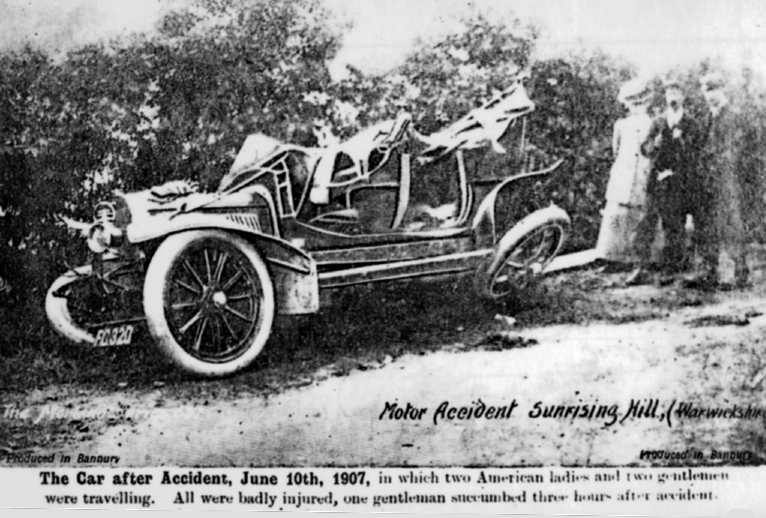
Two further fires are recorded during 1907, one at Mr Gardner’s home in Tysoe (Total cost of attendance £1-9-9d) and the other at Mr Collett’s, also in Tysoe, which cost £2-1-0d.
On Wednesday, 31 October 1907 a presentation was made to Mr Berridge, Honorary Secretary, on the occasion of his leaving the Brigade to go to Scotland. A supper was held in the Engine House and he was presented with a tobacco pouch and pipe inscribed with his initials.
1908
Eighteen caps were purchased, each bearing crossed nozzles and the number 13. The caps were supplied by Gammages at a total cost of £2-19-6d.
Thursday 4 February 1909, Concert
A concert was held in the National School, Tysoe for the benefit of the Brigade. A hearty vote of thanks was accorded to Mr L Smith and to all the ladies and gentlemen who so kindly assisted to make it a great success. £6-5-9d was raised for the Brigade funds.

Mr W Pargeter, who had been the first Captain of the Brigade in 1897, and Mr L B Smith resigned from the Brigade. In recognition of all their valuable work for the Brigade it was agreed to give each of them a present from the funds.
There was a fire at Mr Buckingham’s Farm near Compton Wynyates. The cost of attendance is recorded as £1-0-0d.
Mr W Page supplied a horse for fire drill, at a cost to the Brigade of £0-2-6d per year.
On 7 October 1909, Mr G Paxton was elected Captain in place of Mr C Clark Snr.
1910
A new 40 ft pole, to be used for hanging and drying hoses on, was purchased from Mayo and Son of Shipston on Stour at a cost of £0-10-6d plus an erection charge of £0-2-0d.
For drill on Good Friday the expenses amounted to £0-12-0d.
Wednesday 12 May 1910, Menagerie Overturned on Sunrising Hill
The bugle was sounded in the village, but on this occasion there was no fire. Wild animals, including lions, were said to be roaming around on the local hillside.

Villagers, with some members of the Fire Brigade, set off to Sunrising Hill with guns and nets. A travelling show, or menagerie, was en route from Banbury to Stratford upon Avon. The proprietor of the show was Mr Sidney Edwards and it was advertised as Noah’s Ark. The show took the form of a miniature travelling zoo and consisted of a caravan and two decorated vans containing the animals, all of which were drawn by a “powerful engine”. Mr Edwards had been advised to take the longer but safer route by way of Warmington Hill, Radway and Kineton, but apparently chose not to take that advice. As the cavalcade descended Sunrising Hill at an excessive speed, momentum built and became too great for the brakes. When the brakes were applied at full power, the disaster occurred.
The caravan containing the lions overturned, but fortunately the lions were prevented from escaping.
It was two days later, on the Friday, before an engine could be procuredfrom Mr J W Harris at Hook Norton and the van could be righted. The cavalcade returned to Banbury and put on another show there.
1912
Mr C Clark, ex Captain, and Mr D Durham were asked to return their Brigade caps and cease to be members of the Fire Brigade as they had not been attending drill.
The Annual Supper was held in December.
The Engine House was white-washed by volunteer members. The materials cost £0-3-6d.
8 August 1912, Car Accident on Sunrising Hill
A small two-seater Hupmobile car came to grief. It left the road and ran into the side of the Hill. Two horses were required to drag it free, and no-one was badly injured.
8 August 1912, The Village Hospital Sunday March
The members of The Oddfellows, The Ancient Order of Foresters and The Fire Brigade all met at Upper Tysoe and marched to the schoolroom. They were headed by the Wesleyan Band.
8 March 1913, Fire at Brixfield Farm, Tysoe
The cost of attendance at this fire was £0-10-0d.
18 March 1913, Dance at the Engine House
Records show that the Engine House was used for dancing ‘all night long’. The old post windmill off Oxhill Road, Tysoe was destroyed by fire and abandoned leaving only the mill on top of Windmill Hill.
1914
Expenses for a horse for drills this year amounted to £0-5-0d.
1915
A new basket was bought from W L Bradley at £0-3-9d. The funds were also set back this year by the princely sum of £0-0-41/2d, the cost of a new lamp wick.
The windmill on top of Windmill Hill was struck by lightning and the sails destroyed by fire whilst it was still working. The windmill has not been used as a mill since that time, although corn was milled by use of an Engine Mill at the bottom of Smarts Lane.

1916
A hearty vote of thanks was accorded to Captain G Paxton, Engineer W Usher and Assistant Engineer G Hancox for their past service to the Brigade.
Fireman killed in War
Mr Fred Woodfield, a fireman at Tysoe from 1906, was killed during November 1916.
1917/1918, Two Tysoe Firemen killed in War
Fireman Walter Page was killed in action on 16 October 1918. He had been a Tysoe fireman since 1908. The Fire Brigade was in full attendance at a memorial service held in Tysoe Church.
Fireman Arthur Townsend, a member of the Brigade since 1911, was called up for service in March 1917 and killed on 6 December 1917. He leaves a widow and a son. A memorial service was held in Tysoe Church on 27 January 1918. All the Fire Brigade attended in a body.

1919
A concert was held in the school to help the funds. The cost of the concert included Entertainment at £2-0-0d and Hire of School £0-10-0d. Proceeds from the concert amounted to £9-5-6d. The funds received donations of £0-5-0d from Mr J Styles and £1-0-0d from Mr J Middleton.
1920
It was proposed to recruit more members to join the Brigade.
1921, Fire in new houses
A fire was reported in new houses being built in the village. At number 1, Avon Avenue a tramp set fire to some wood belonging to the builders in order to keep warm, and set the house on fire. Costs were £2-0-0d.
The refreshments at this fire cost £0-4-8d. An offer was accepted of £3-0-0d as a donation to the Brigade for attending this fire with £2-0-0d to go to the funds and £1-0-0d paid to cover expenses.
No more major fires were registered until 1948.
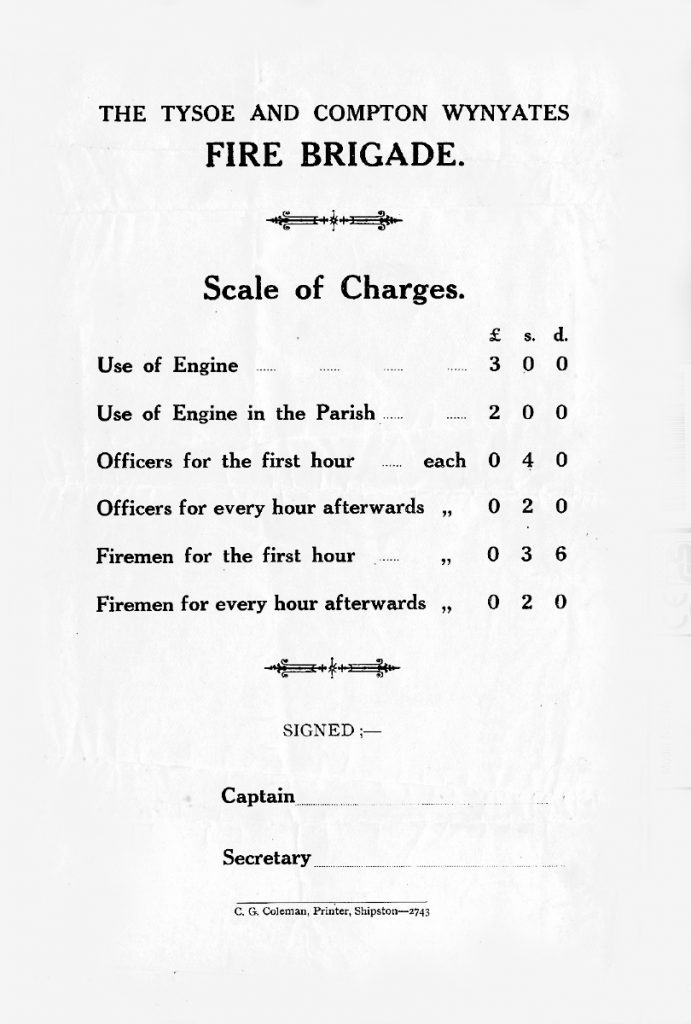
1922
Whist drives were held to help the funds. Proceeds from these during the year were £6-0-0d.
1925
The Manual Pump was in a poor state, needing extensive repair by Firemen G Paxton and W Usher. New leather washers and copper rivets cost £0-6-6d, oil and candles £0-1-3d.
1926
A dance was held in December 1926 to improve the Brigade’sfinances. Proceeds from the dance were £3-2-0d. Engineer’s expenses were approved at £0-16-0d.
1927
Further repairs were necessary to the Manual Pump, with oil and leathers costing £0-7-5d.
Engineer’s expenses agreed at £0-4-0d.
1928
A donation is recorded from Miss Ridler, from the whist drives, of £2-1-0d. The death occurred of Lieutenant Mr F Bloxham, who had held the office of Lieutenant for nineteen years. Engineer’s expenses were approved at £0-9-6d.
1929/30
Mr G Paxton retired as Captain of the Brigade, and Mr W Usher was elected Captain in his place. Two new Hurricane Lamps were purchased at a cost of £0-5-6d. Engineer’s expenses for 1929 were £0-17-0d, and for 1930 £0-16-0d.
1931
Once again a dance was organised to supplement the funds, and the proceeds from this were £3-5-0d. Engineer’s expenses amounted to £0-12-8d. More work was necessary to the old Manual Pump, including new leather for the pump at a cost of £0-5-0d.
1932
During renovation works at Tysoe Manor, the following record of an event, which took place in 1834, was found by the builder, Mr Quinton Snr., below some floor boarding.
“Richard Bustin age 42 years was hanged for setting fire to Edward Sheldon Esqr’s Ricks (13 in No.) at William Baker at Brailes on Aug 15 1834. He was a native near Stow.
Mr John Berrill Steward at Compton age 42 years, Daniel Wells age 26 years, Rich’d Turner age 53 years, Laide this flowr August 1834.
William Ainge aged 56 years, Rich’d Ainge aged 52 years both resided on the farm and gave them plenty of cider. Finish carreing wheat 8th day of August 1834 and the best crop that has been for a number of years. He was publicly hanged in the County Jail at Warwick.”
The brigade accepted with regret the resignation of the Captain, Mr W Usher, who has now left the village. He was Engineer for 29 years, Lieutenant for 1 year and Captain for 3 years.
Mr J Philpot was elected Captain.
Engineer’s expenses were approved at £0-10-2d.
